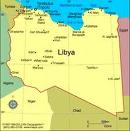LIBYA: Mounting Resistance against NATO Occupation and NTC Proxy Regime

Occupied Libya isn’t pretty. Libya SOS said its government “recognize(d) the presence of the forces belonging to 14 different nationalities in the country under the umbrella of the training, assistance and advice.”
In mid-January, 12,000 US troops sent to Malta readied to occupy Libya. Around 6,000 or more now guard oil facilities. Perhaps contingents from other nations guard other strategic locations. People needs aren’t addressed. Exploiting, not helping, them is planned.
On January 5, London’s Independent headlined, “Libya’s leader warns of civil war after Tripoli gun battles,” saying:
Mustafa Abdul Jalil, Washington’s man in Libya, commented after rival militia gun battles left “a trail of dead and injured.”
According to Jalil:
“We are now between two bitter options. We deal with these violations by brigades strictly and put the Libyans in a military confrontation which we don’t accept, or we split and there will be civil war. If there’s no security, there will be no law, no development and no elections.”
At issue are turf battles, anger about being left out of NTC plans, and promises made, then ignored or broken.
On January 22, The New York Times headlined, Libya Protests Spur Shake-Up in Interim Government,” saying:
Libya’s NTC “faced a political crisis Sunday after protesters ransacked its offices in Benghazi, highlighting growing nationwide unease with its leadership and triggering a shake-up in which the governing council’s No. 2 official resigned and several members were suspended.”
Lawyer/political activist Salwa Bugaighis worried that conditions will “become worse.”
On Sunday, about 2,000 protesters raged outside NTC Benghazi headquarters. Using grenades, iron bars and stones, they set exterior grounds ablaze, broke windows, forced their way inside, ransacked offices, and confronted Jalil angrily.
Weeks earlier, they pitched tents outside NTC headquarters, protesting unaccounted for government money and secretly drafted election laws. According to lawyer Tamer al-Jahani:
“The election laws have not been approved by thousands of Libyans and do not honor those who died for our freedom. We don’t want to replace one tyrant with another.”
Tyranny is in the eyes of beholders. Most Libyans supported Gaddafi and still do. Why not in a nation with Africa’s highest standard of living until NATO arrived. Now ravaged in shambles, it’s earmarked for plunder.
On January 22, BBC said NTC deputy chief Abdel Hafiz Ghoga resigned following growing protests against him. “My resignation is for the benefit of the nation,” he said.
In fact, he feared for his life after being accosted at gunpoint twice beaten twice, beaten, and called a “NATO mercenary.”
Conflicting reports suggest Jalil and officials close around him may resign over anger about their rule. Perhaps so if they continue and grow.
On January 23, Libya SOS said NTC officials met secretly at an undisclosed location to adopt new election laws. Legal affairs head Salwa al-Digheili said secrecy was for “security reasons.”
On January 2, an earlier draft was released, provoking anger. Dual-nationals were barred from seeking office. A 10% quota for women in Parliament was set. Feminists called it “insulting.” They oppose any quota.
The New York Times also reported Misrata protests, and plans for local council elections “without the (NTC’s) blessing…”
Misrata council spokesman Mohamed Benrasali said:
“Everywhere there have been (anti-NTC) sit-ins and demonstrations. (People are) accusing it of no transparency and dragging its feet and not taking any actions for transitional justice, and many, many (other) issues.”
“We feel that the head of the regime has changed, but the rest of the regime is in place.”
“It seems to us that these people are no different than Gaddafi, and they only speak the language of force.”
NTC critics also complain about “nuts-and-bolts level” abuses. Basic services aren’t restored. Sirte, Bani Walid, and other devastated areas remain in ruins with no restoration plans.
Tripoli’s still violent. Regional militias control it. Days earlier, explosions rocked the city. Fighting raged around Mitiga International Airport and other areas.
On January 23, London’s Guardian headlined, “Gaddafi loyalists take back Bani Walid,” saying:
“Reports said at least four people were killed during clashes” between both sides. Many others were injured. According to Reuters, “They control the town now.”
These and other clashes show “evidence of the NTC’s weakness, incapacity and internal divisions ahead of supposed national elections later this year.”
Tribesmen are boiling inside and trying to regroup “into a new insurgency…..Warfalla men of Tripoli and elsewhere are sending around text messages, saying, “We need to gather and do something about this. Let’s gather! Lets gather!”
On January 20, Pravda.ru contributor Konstantyn Scheglikov headlined, “Libyan Resistance and western hypocrisy,” saying:
“Resistance leaders spoke about the creation of a temporary government in Libya.” At issue is replacing the illegitimate NTC. An alternative “government is being launched on a temporary basis until full Libyan liberation from NATO invaders.”
People’s Committees will replace them. At issue is reestablishing Jamahiriya governance and letting Libyans choose their own leaders. Western power brokers want restoration efforts suppressed.
They’ve already spread across Libya. Tribes are uniting for change. Terror tactics and disinformation confront them. Resistance continues.
Libyans want Western repression ended and Jamahiriya government restored. Getting it requires sustained struggle. It’s ongoing and growing.
Stephen Lendman lives in Chicago and can be reached at [email protected].
Also visit his blog site at sjlendman.blogspot.com and listen to cutting-edge discussions with distinguished guests on the Progressive Radio News Hour on the Progressive Radio Network Thursdays at 10AM US Central time and Saturdays and Sundays at noon. All programs are archived for easy listening.
http://www.progressiveradionetwork.com/the-progressive-news-hour/

